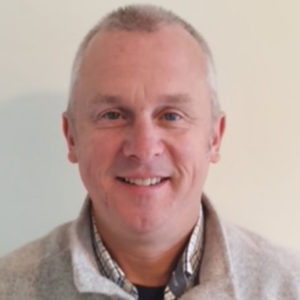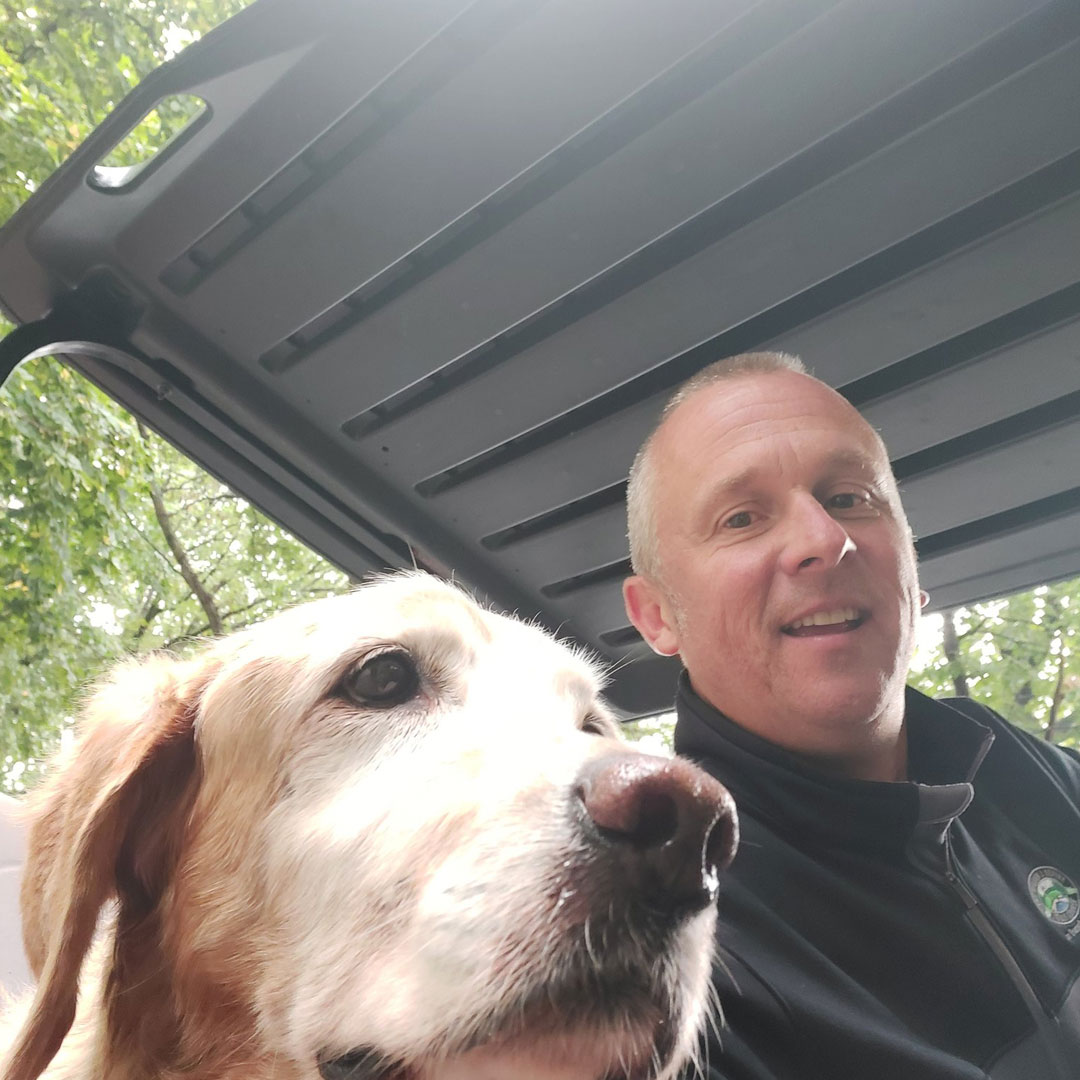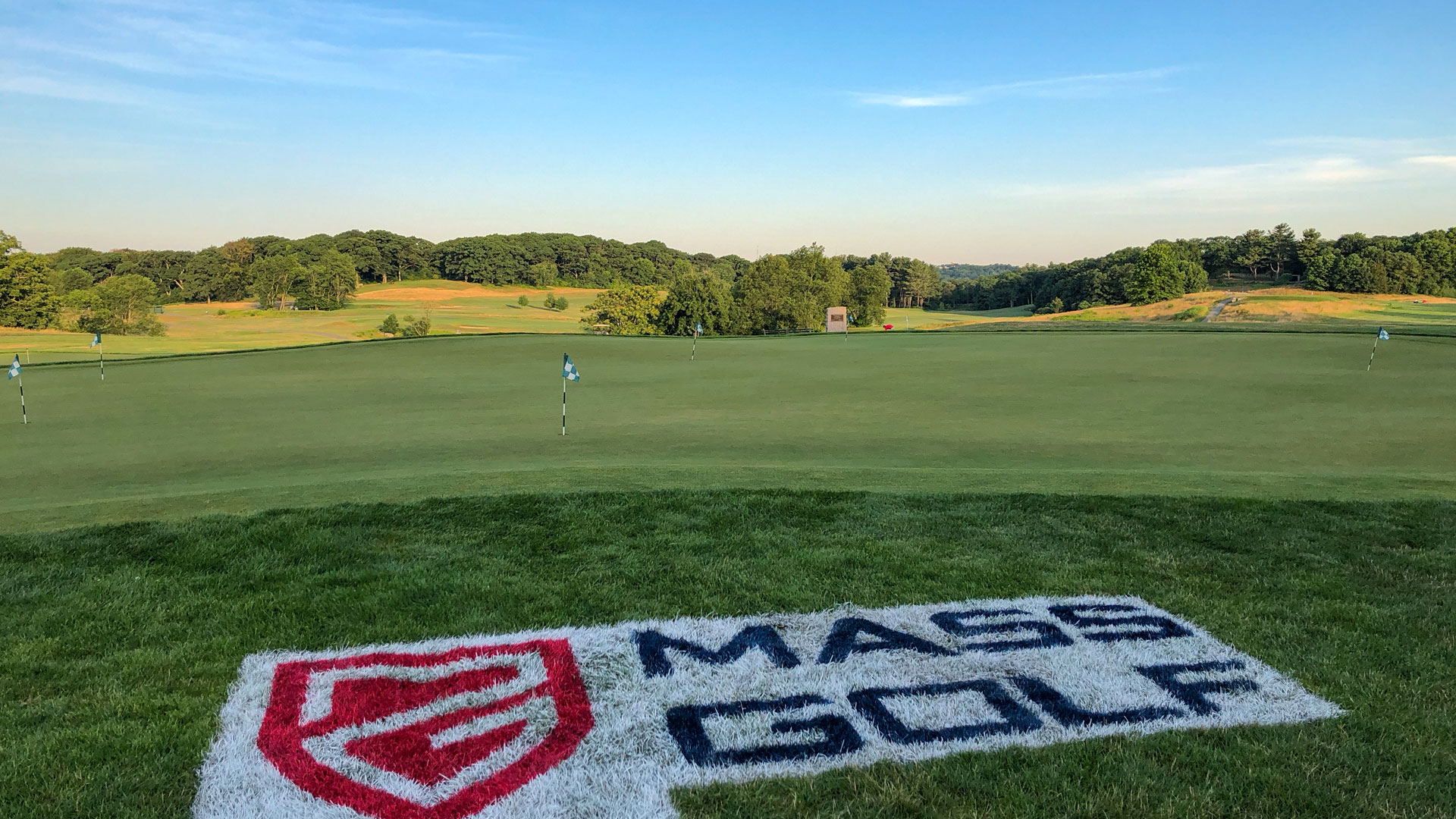Since 2001, Russell Heller has been in charge of maintaining and improving the second oldest municipal golf course in the country.
As superintendent of Boston’s William J. Devine Golf Course, Heller has been a steady hand for the must-visit public track. He’s overseen the gradual implementation of the course’s master plan, including improved teeing grounds. And up until last fall was often spotted on the course with his dog Giselle.
A recreational golfer at a young age, Heller graduated with a Turfgrass Management degree at the Stockbridge School of Agriculture at UMass Amherst and had several stints at Mass Golf Member Clubs, including Andover Country Club, Tewksbury Country Club, and Chelmsford Country Club. He joined Sterling Golf Management and in 1996 became a member of the Golf Course Superintendents of New England (GCSANE). Since joining the GSCANE Board of Directors in 1999, Heller has served as president but has primarily been interested in government relations where he’s interacted with lawmakers, both in Massachusetts and Washington, D.C. to discuss industry practices.
Heller is now being awarded GSCANE’s Distinguished Service Award for his many years in the industry. As one nominator said, “Russ has done it all for GCSANE.”
Mass Golf caught up with Heller to get his reaction to the award, reflect on his career journey and discuss some of the present challenges facing golf course superintendents.

This interview has been lightly edited for brevity and clarity.
Mass Golf: What does it mean to be recognized by your peers with this award?
Russell Heller: I was most definitely surprised when that phone call came in, that’s for sure. But it’s nice to be appreciated, especially by your peers. I’m definitely honored.
MG: What kind of initially piqued your interest in going this route and pursuing a career in agronomy, especially with golf?
RH: I worked summers landscaping and I was trying to figure out what to do with my life. I liked it and decided to enroll in Stockbridge, and one thing led to another and I got into golf and pretty much stayed there my whole career. I like working outside and definitely wasn’t the kind of person who wanted to sit inside of the building in an office cubicle all day. When I played golf, it was purely recreational. I didn’t work on a golf course, I just played and watched socially.
MG: When you started working in golf was there somebody who really mentored you and took you under your wing?
RH: I did my internship at Andover Country Club with Wayne LaCroix, who’s still there. And then when I graduated it turned out one of his assistants was leaving, so he offered me the job. And then shortly after the other superintendent left. So I just moved right up in that first assistant position. And yeah, it was a great experience and a great place to learn about becoming a superintendent and golf course maintenance. It’s a great place to learn about some of the other stuff that doesn’t necessarily involve golf because the owner was developing the area around the golf course. There were homes going in or roads or utilities so it was kind of a learning experience with some of that stuff, too.
MG: So how did you go from being an assistant superintendent at these local courses to taking the job at Franklin Park?
RH: When I started here, I was working for Sterling Golf Management, and they were running the golf course at the time. The previous superintendent left and took another job, and they brought me in and put me over here. The city already had a master plan in place for the golf course, and they were getting ready to put a new irrigation system in which was a big positive. So once the irrigation system was done, then we were able to start making improvements on the golf course. Just about every year we’ve had some sort of project going on. We’ve got DHT Golf doing some teeing areas over now. We’ve also done a couple of small house projects just to try to keep everything up to date and keep the course current.
MG: What’s kept you here for 20-plus years? Is there a sense of pride tending for such a historic course in Boston?
RH: It’s a good spot to work. Every place has its challenges, but I like the golf course. People are good here. The city’s been willing to make some improvements every year so it doesn’t get boring over here. I also prefer playing the older style golf courses. I like the history behind everything here so that’s definitely been a positive aspect of the job.

MG: What got you interested in serving on the Board of Directors for the Golf Course Superintendents Of New England?
RH: When I was working for Wayne, he was on the board for a while and he was the newsletter chairman. I kind of helped him with that a little bit. And then the opportunity just kind of presented itself as they were looking for people. I’ve always been one of those guys that volunteers a little bit for certain things so I got on as newsletter chairman. I did that for three years and then moved my way through the board of directors until I became president in 2007. That’s a great experience. You meet a lot of me a lot of industry people.
I’ve always kind of followed along with the government relations-type stuff. When I was on the board of directors, we brought in a golf lobby firm that is part of the green industry alliance. Every spring they have “ag days” (agriculture) at the statehouse.
MG: You’ve hosted a Franklin Park field trip in the past. What is that experience like demonstrating your job to students?
RH: I was able to form a relationship with a school down the street. I went to a show in San Diego where they are they did a seminar where they take you on field trips so I kind of used the template they had and we hosted about 30 kids for about 2-3 hours in the morning. We got some volunteers in the industry we show them some of the tools we use on the golf course, how we use math, just basic like square footage and how water moves through soil. We let them use the putting green and putt around and all that. It was definitely a positive experience.
MG: What are some of the industry challenges you’re confronted with today?
RH: Labor. Like everybody, it’s getting hard to find people who want to work this job specifically. Salaries and benefits might have to go up, but in order to get people, we have to stay competitive. It’s not easy asking someone to come in at 5 a.m. on a Sunday morning. But for some people, that’s exactly what they want. But the key is finding those people and then retaining them. Last year, I probably had half the staff I really needed, and we’re doing a large number of rounds so it’s difficult. We take care of everything up the middle as much as we can. In the past, I might’ve sent guys out three times a week to hand rake bunkers, but now maybe I send one guy out with a machine to do it once or twice a week.
MG: How much do you see technology, especially robotics, shifting how work gets done in the future?
RH: I think that probably has some potential in a few years. The manufacturers are working on this stuff. Toro has an autonomous fairway mower for instance. Some courses will have to wait and do a cost-benefit analysis. I can’t imagine those things going to be cheap. We just do the best we can and take care of the guys who work for me.
MG: Would you welcome technology to repair ball marks?
RH: I’ve seen poorly-repaired ball marks that will make you pull your hair out. I’d prefer you didn’t fix it then fix it poorly, but it’s a simple thing, and I think if you’re going to play the game you should at least learn how to do it.
MG: I know there’s snow on the ground now, but what are you most looking forward to this upcoming year?
RH: The last two years we’ve had a huge increase in rounds. As for this year, I expect something similar. I’m interested to find out if having the U.S. Open nearby has an effect on the golf course here. Maybe we’ll see more out-of-town people. I don’t know exactly what that looks like just yet, but I hope it’s a good year.
